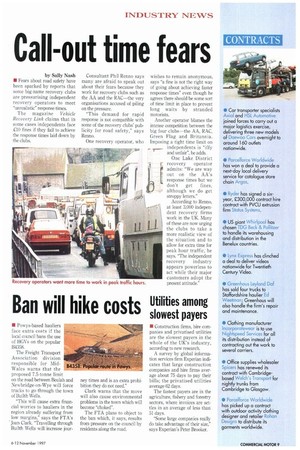Call-out time fears
Page 11

If you've noticed an error in this article please click here to report it so we can fix it.
by Sally Nash • Fears about road safety have been sparked by reports that some big-name recovery clubs are pressurising independent recovery operators to meet "unrealistic" response times.
The magazine Vehicle Recovery Link claims that in some cases independents face £10 fines if they fail to achieve the response times laid down by the clubs.
Consultant Phil Renno says many are afraid to speak out about their fears because they work for recovery clubs such as the AA and the RAC—the very organisations accused of piling on the pressure.
"This demand for rapid response is not compatible with some of the recovery clubs' publicity for road safety," says Renno.
One recovery operator, who wishes to remain anonymous, says "a fine is not the right way of going about achieving faster response times" even though he agrees there should be some sort of time limit in place to prevent long waits by stranded motorists.
Another operator blames the intense competition between the big four clubs—the AA, RAC, Green Flag and Britannia. Imposing a tight time limit on independents is "iffy and unfair", he adds.
111■•••••
One Lake District recovery operator admits: "We are way out on the AA's response times but we don't get fines. although we do get stroppy letters."
According to Renno, at least 3,000 independent recovery firms work in the UK. Many of these are now urging the clubs to take a more realistic view of the situation and to allow for extra time for peak hour traffic, he says. "The independent recovery industry appears powerless to act while their major customers adopt the present attitude."




















































































































